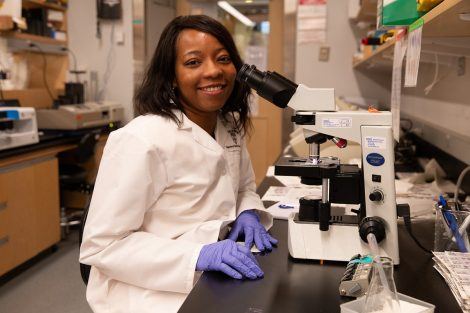Lọla Fagbami, PhD ’19, is pursuing a novel approach to understanding how the malaria parasite becomes drug resistant.
June 3, 2019—Lọla Fagbami doesn’t remember the first time she got malaria, but she remembers the last time she got it. She was in 8th grade, attending boarding school in Oyo state, Nigeria, when she began feeling unwell. “I would go from being overwhelmed with a high fever to feeling freezing cold,” she recalled. “And when the fever spiked, my whole body ached.”
Each year, 200 million people become sick with malaria and 400,000 die, many of them children under the age of 5. Fortunately, Fagbami had access to good care and the appropriate medications. She recovered quickly and not long after moved with her family to the U.S., settling in Delaware. Soon the threat of malaria—and Plasmodium falciparum, the parasite that causes it—became a distant memory.
Fagbami excelled as a student. She attended Emory University, where an inspiring professor sparked her interest in chemistry, which became her major. She particularly enjoyed organic chemistry, she said, because it forced her to think about how the world around us is ordered.
After graduating from Emory in 2006, Fagbami began working in the pharmaceutical industry. She steadily climbed the career ladder, but soon came to the realization that, in order to continue her professional ascent, she needed to advance her education. Fagbami returned to school and earned two master’s degrees from Rutgers University—one in biomedical sciences and one in public health. “That’s really where my interest in global health began to take shape,” she said.
Seeking intellectual stimulation
In 2014, Fagbami was accepted into Harvard’s Chemical Biology PhD Program, based at the Graduate School of Arts and Sciences, in which students are expected to rotate through two to four laboratories before selecting a dissertation project. Because the program collaborates across the university, as well as with nearby hospitals and labs, the options seemed endless. “It kind of brought on the paralysis of choice,” Fagbami said. “But I knew that as long as I was working on a problem that was intellectually stimulating, I’d be fine.”
One area of research that Fagbami found particularly interesting was the phenomenon of drug resistance. She was endlessly intrigued by how microorganisms evolve to evade the effects of medications.
During her rotations, Fagbami ended up working in the lab of Dyann Wirth, Richard Pearson Strong Professor of Infectious Diseases at Harvard T.H. Chan School of Public Health and one of the world’s leading experts on malaria. While Fagbami had spent a few years working at the intersection of public health and pharmaceutical research, she had not considered studying malaria or its causative agent before joining Wirth’s lab.
The more she and Wirth talked, the more interested she became in studying drug-resistant malaria. Cases are steadily climbing, and the World Health Organization warned last fall that the rise of drug-resistant malaria could unravel years of global progress against the disease.
Switching tactics
For her thesis work, Fagbami worked with Wirth’s labs at Harvard Chan School and the Broad Institute, as well as with Ralph Mazitschek at Massachusetts General Hospital, to study how the metabolism of P. falciparum may contribute to the formation of drug resistance.
Specifically, she wanted to understand the mechanism that allows the malaria parasite to make a metabolic adaptation that dramatically increases the production of an amino acid called proline, which appears to reduce the efficacy of certain antimalarial compounds. “I was able to show that the parasite makes this additional proline by synthesizing it from another amino acid,” she said. “And we found that if you prevent this synthesis of proline, then the parasite isn’t able to make this metabolic adaptation that drives drug resistance.”
Wirth noted that Fagbami’s approach is novel because much of the existing research on drug resistance focuses on genetic changes within the parasite—not metabolic adaptations.
“Lọla’s research could translate into new drug targets and new approaches to discovering drug targets,” Wirth said. “It may be that metabolic adaptation is in fact the first thing that happens in nature, and if we can find a way to detect that early on, we might be able to find a way to stop the spread of drug resistance.”
After graduation, Fagbami will pursue a postdoc and eventually wants to become a professor. One way or another, she said, she hopes to keep studying malaria. “It’s all I’ve thought about for the past five years, and I want to keep thinking about it,” she said. “As I like to say, I got infected.”
Photo: Sarah Sholes
